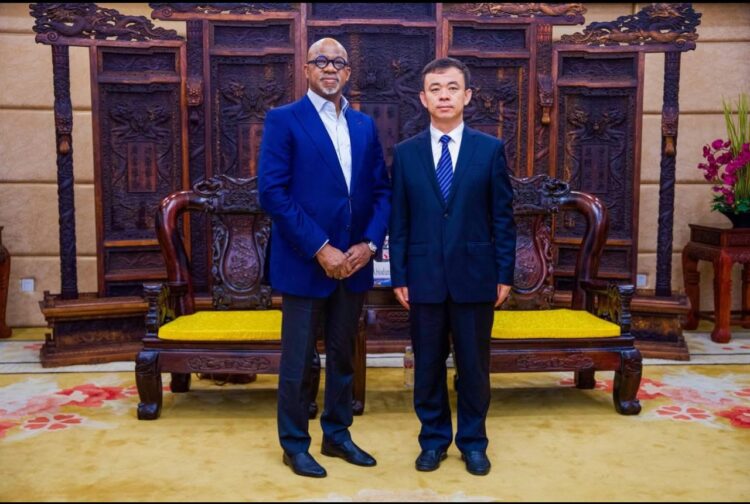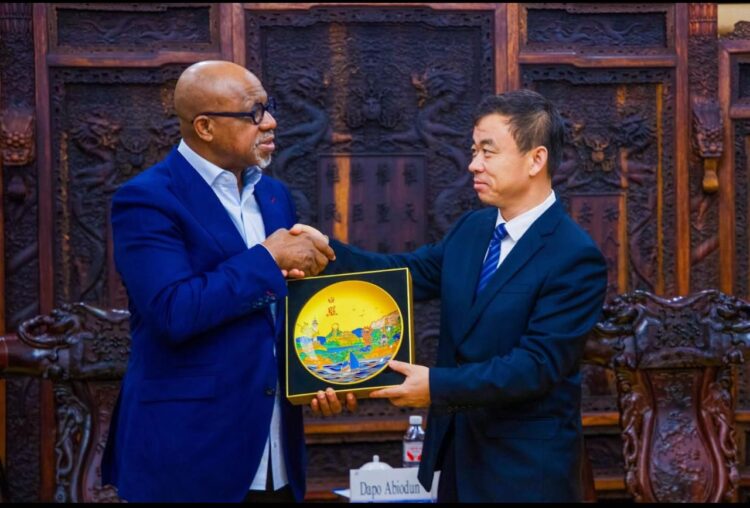By Lanre Alfred
I have always believed that destiny, when it chooses a man, wraps him in both burden and brilliance. And watching Prince Adedapo Abiodun, the Executive Governor of Ogun State, navigate the treacherous waters of Nigerian politics while scripting a new industrial renaissance for his state, I am persuaded that fortune has handed him a historic script; and he is doing justice to it.
Ogun is not new to promise. From the days of Obafemi Awolowo, the state has been celebrated as a hub of intellect, artistry, and culture. But promise without power is tragedy deferred.
For years, Ogun, despite its proximity to Lagos and its wealth of land, minerals, and talent, lagged behind in industrial reckoning. It remained a supporting act in Nigeria’s economic arena, never quite stepping boldly into the limelight. That script, I daresay, is being rewritten, and Dapo Abiodun holds the pen.
When I read of his exploits in Rizhao, China, I realized Ogun had crossed a Rubicon. What business does a governor from a relatively small Nigerian state have engaging titans of Asian industry, walking their factory floors, selling Ogun as though it were the new frontier of prosperity? Everything. Absolutely everything. For a governor who understands that industry is not wooed by speeches but by strategy, not seduced by promises but by proof, Abiodun’s diplomacy is no perfunctory performance. It is Ogun’s industrial revolution set to music.
Take Rizhao’s automated seaport, for instance. A spectacle of cranes, containers, and clockwork precision. Abiodun stood there as a titan with ambition. He has long dreamed of the Olokola Deep Sea Port, a facility that could reposition Ogun as West Africa’s maritime hub. Standing in Rizhao, he glimpsed the future. For once, I felt a Nigerian governor had stepped out of the narrow dance of survival politics into the expansive dome of justifiable stewardship.
But it wasn’t just about ports and ships. He courted BlueCarbon, one of China’s solar giants. He spoke of Ogun’s endless sunlight, its silica deposits, and its readiness to lead Africa’s green energy revolution. He turned a factory visit into prophecy, making a case for Ogun as Nigeria’s renewable energy capital.
At Inspur, China’s IT powerhouse, he marketed Ogun’s Tech Hub in Abeokuta as Africa’s future Silicon Valley. At Shandong, Abiodun was less a politician and more a Renaissance envoy, turning Ogun into a promise that investors could no longer ignore.
And investors are not ignoring him. The Lee Group, already established in Nigeria, is committing another $50 million into Ogun. Factories are multiplying. Detergents, food products, and other commodities will soon flow out of Ogun into Nigerian markets and across oceans to Europe and America.
Royal Ceramic has lauded Ogun’s infrastructure and policies, expanding in Sagamu because the ground has been fertilized by purposeful leadership.
Now, let me confess: I have seen governors drown in slogans and choke on mediocrity, their grandstanding louder than their achievements. But Abiodun has distinguished himself by embracing quiet but decisive diplomacy. He does not court cameras as much as he courts investors. And that, I dare say, is the very definition of leadership in this unforgiving era.
Does he have critics? Of course. Some say geography alone explains Ogun’s rise: its nearness to Lagos, highways, and industrious people. But geography without vision is a waste. Lagos is close to many states, yet Ogun is the one hoovering investments at a pace that startles pundits. I insist: it is not proximity but policy.
What Abiodun is constructing is nothing less than a new identity for Ogun. For too long, Ogun has lived in the long shadows of Lagos, its neighbor and rival, whose booming ports and glittering skyline often drown out every other story in the South West. But Abiodun has refused to allow his state to remain in that muted corner. His blueprint is about reshaping how Ogun is seen, not only by Nigerians but by the rest of the world. It is about giving the state a reputation beyond being Lagos’ hinterland or a historical footnote in the tale of Yoruba intellectualism. He is crafting Ogun as a powerhouse in its own right, a state that trades in culture and promise alongside tangible, industrial might.
For decades, Ogun’s children have been its greatest exports. Ask anyone who follows the intellectual, professional, or cultural history of Nigeria, and they will confirm this. The state has given the country some of its most brilliant scholars, its boldest writers, its most innovative entrepreneurs, and its most formidable public servants. Names like Wole Soyinka, Fela Anikulapo-Kuti, and Obafemi Awolowo resound across time as proof that Ogun has never been short of human talent. Its sons and daughters have excelled abroad, taking their Ogun heritage into boardrooms in London, lecture halls in the United States, and diplomatic missions in Geneva. The irony, however, is that while Ogun’s people carried its torch abroad, the soil itself seemed to wait, neglected and untransformed.
Abiodun is flipping that script. He is ensuring that Ogun no longer measures its pride only by the exploits of its children overseas or across state borders. Now, the state itself is stepping into the role of an exporter: sending products, commodities, and industrial outputs far beyond its boundaries. In Sagamu, tiles and ceramics are already rolling out of factories that compete in quality with those from Italy or Spain. This is not the Ogun of old, waiting for applause from the diaspora; this is the Ogun that stands at the frontier of global commerce, making sure its name is stamped not only on diplomas but also on export certificates.
In Ota, the story is similar. The town, long known for its bustling markets and its manufacturing clusters, is being positioned as a hub for consumer goods. Detergents, food products, and other essential commodities are being produced there not only for Nigerian homes but increasingly for foreign markets. Where once the state could boast mainly of producing lawyers and academics, it now takes pride in producing what every household needs.
And then there is Abeokuta, the historic capital that has always been the intellectual heart of Ogun. Under Abiodun, it is becoming the nerve center of technology. The Ogun Tech Hub is already attracting startups, coders, and investors, making Abeokuta a place where new ideas are incubated and launched. The dream is that one day soon, young innovators in Abeokuta will design apps and digital solutions used across Africa, if not the world. Ogun, once known only for raising poets and politicians, will also raise billion-dollar tech companies. In that shift lies the deeper renaissance Abiodun is determined to script.
And looming on the horizon, gleaming like a promise beneath the skies, are solar panels; factories that will one day convert Ogun’s abundant sunlight into power, for its industries and millions of homes across Nigeria. Imagine Ogun as the capital of Africa’s renewable energy revolution, producing solar technology that powers Lagos skyscrapers, Abuja villas, and Ghanaian farmlands alike. That is the identity Abiodun is building: a state that no longer exports only people but power, technology, and products that define modern living. It is an Ogun reimagined, an Ogun reborn, an Ogun finally living up to the potential its children always embodied.

But let us not be deceived. This renaissance is delicate. Nigeria’s larger political and economic quagmires threaten every state, Ogun included. Investors are notoriously fickle; confidence can turn to skepticism at the hint of insecurity, corruption, or instability. Abiodun must remain relentless in curbing these threats. The enemies of progress are never far; they lurk in bureaucracy, in rival camps, and in the temptation to rest on laurels.
Still, I cannot shake the sense that we are witnessing something remarkable. History rarely grants Nigerian statesmen the opportunity to be both visionary and effective, to dream audaciously and deliver concretely. But Abiodun has been handed that delicate balance. From Rizhao to Sagamu, from the boardrooms of Shandong to the streets of Abeokuta, he has charted Ogun’s ascent with the calmness of a diplomat and the boldness of a pioneer.
I will remember this moment as Ogun’s golden dawn, when a governor chose to lead by opening doors across oceans. It is a rare gift: a Renaissance man at the helm of a state on the cusp of industrial glory. And if he stays the course, Ogun will not just be Nigeria’s industrial capital, it will become Africa’s economic compass.
So, when next the cynics scoff and the critics sneer, I will remind them that industrial renaissances are not born in noise but in vision, not in chants but in contracts, not in politics as usual but in diplomacy that matters.
Prince Dapo Abiodun has chosen the harder path; the path of building. And that is why Ogun, once muted in Nigeria’s industrial chorus, now sings at the center of Africa’s economic overture.
And as I watched him declare Ogun’s promise in Rizhao, as I listened to his conviction about ports, solar plants, ceramics, and tech hubs, I thought to myself: Here walks not just a governor, but a Renaissance man, leading his people from the margins into the sunlit core of destiny.




